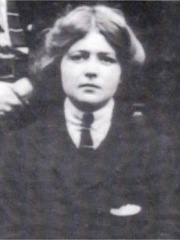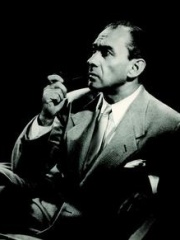
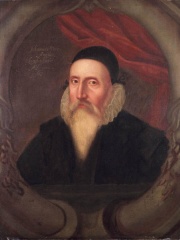
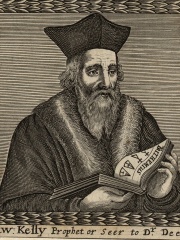
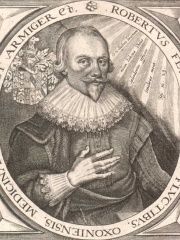
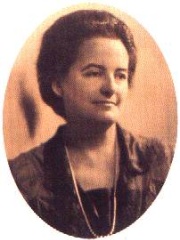
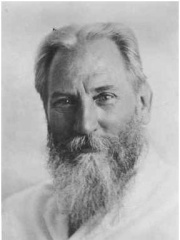
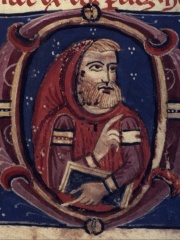
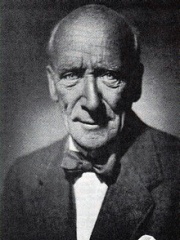
The Most Famous
OCCULTISTS from United Kingdom
This page contains a list of the greatest British Occultists. The pantheon dataset contains 41 Occultists, 12 of which were born in United Kingdom. This makes United Kingdom the birth place of the most number of Occultists.
Top 10
The following people are considered by Pantheon to be the top 10 most legendary British Occultists of all time. This list of famous British Occultists is sorted by HPI (Historical Popularity Index), a metric that aggregates information on a biography's online popularity. Visit the rankings page to view the entire list of British Occultists.

1. Aleister Crowley (1875 - 1947)
With an HPI of 83.14, Aleister Crowley is the most famous British Occultist. His biography has been translated into 58 different languages on wikipedia.
Aleister Crowley (; born Edward Alexander Crowley; 12 October 1875 – 1 December 1947) was an English occultist, ceremonial magician, poet, novelist, mountaineer, and painter. He founded the religion of Thelema, identifying himself as the prophet entrusted with guiding humanity into the Æon of Horus in the early 20th century. As a prolific writer, he published widely over the course of his life. Born to a wealthy family in Royal Leamington Spa, Warwickshire, Crowley rejected his parents' fundamentalist Christian Plymouth Brethren faith to pursue an interest in Western esotericism. He was educated at Trinity College at the University of Cambridge, where he focused his attention upon mountaineering and poetry, resulting in several publications. Some biographers allege that here he was recruited into a British intelligence agency, further suggesting that he remained a spy throughout his life. In 1898, he joined the esoteric Hermetic Order of the Golden Dawn, where he was trained in ceremonial magic by Samuel Liddell MacGregor Mathers and Allan Bennett. He went mountaineering in Mexico with Oscar Eckenstein, before studying Hindu and Buddhist practices in India. In 1904, he married Rose Edith Kelly, and they honeymooned in Cairo, Egypt, where Crowley wrote down The Book of the Law—a sacred text that serves as the basis for Thelema, which he said had been dictated to him by a supernatural entity named Aiwass. The Book announced the start of the Æon of Horus and declared that its followers should "Do what thou wilt": seek to align themselves with their True Will via the practice of ceremonial magic. After the unsuccessful 1905 Kanchenjunga expedition and a visit to India and China, Crowley returned to Britain, where he attracted attention as a prolific author of poetry, novels, and occult literature. In 1907, he and George Cecil Jones co-founded an esoteric order—the A∴A∴, through which they propagated Thelema. After spending time in Algeria, in 1912 he was initiated into another esoteric order, the German-based Ordo Templi Orientis (O.T.O.); he rose to become the leader of its British branch, which he reformulated in accordance with Thelema. Through O.T.O., Thelemite groups were established in Britain, Australia, and North America. Crowley spent the First World War in the United States, where he took up painting, and campaigned for the German war effort against Britain. His biographers later revealed that he had infiltrated the pro-German movement to assist the British intelligence services. In 1920, he established the Abbey of Thelema, a religious commune in Cefalù, Sicily, where he lived with various followers. His libertine lifestyle led to denunciations in the British press, and the Italian government evicted him in 1923. He divided the following two decades between France, Germany, and England, and continued to promote Thelema until his death. Crowley gained widespread notoriety during his lifetime, being a drug user, a bisexual, and an individualist social critic. Crowley has remained a highly influential figure over western esotericism and the counterculture of the 1960s, and he continues to be considered a prophet in Thelema. He is the subject of various biographies and academic studies.

2. John Dee (1527 - 1608)
With an HPI of 80.86, John Dee is the 2nd most famous British Occultist. His biography has been translated into 52 different languages.
John Dee (13 July 1527 – December 1608 or March 1609) was an English mathematician, astronomer, teacher, astrologer, occultist, and alchemist. He was the court astronomer for, and advisor to, Elizabeth I, and spent much of his time on alchemy, divination, and Hermetic philosophy. As an antiquarian, he had one of the largest libraries in England at the time. As a political advisor, he advocated the foundation of English colonies in the New World to form a "British Empire", a term he is credited with coining. Dee eventually left Elizabeth's service and went on a quest for knowledge of the occult and supernatural. He aligned himself with several individuals who may have been charlatans, travelled through Europe, and was accused of spying for the English Crown. Upon his return to England, he found his home and library vandalised. He eventually returned to the Queen's service, but was turned away when she was succeeded by James I. He died in poverty in London, and his gravesite is unknown.

3. Edward Kelley (1555 - 1597)
With an HPI of 67.16, Edward Kelley is the 3rd most famous British Occultist. His biography has been translated into 25 different languages.
Edward Kelley or Kelly, also known as Edward Talbot (UK: ; 1 August 1555 – 1597/8), was an English Renaissance occultist and scryer. He is known for working with John Dee in his magical investigations. Besides the professed ability to see spirits or angels in a "shew-stone" or mirror, which John Dee so valued, Kelley also said that he possessed the secret of transmuting base metals into gold, a goal of alchemy, as well as the philosopher's stone itself. Legends began to surround Kelley shortly after his death. His flamboyant biography, his relationships with Queen Elizabeth I's royal magus John Dee and Rudolf II, Holy Roman Emperor, his repute of having great alchemical skill, and his claimed ability to communicate with angels have all led to his relative notoriety among historians.

4. Robert Fludd (1574 - 1637)
With an HPI of 65.50, Robert Fludd is the 4th most famous British Occultist. His biography has been translated into 28 different languages.
Robert Fludd, also known as Robertus de Fluctibus (17 January 1574 – 8 September 1637), was a prominent English Paracelsian physician with both scientific and occult interests. He is remembered as an astrologer, mathematician, cosmologist, Qabalist, and Rosicrucian. Fludd is best known for his compilations in occult philosophy. He had a celebrated exchange of views with Johannes Kepler concerning the scientific and hermetic approaches to knowledge.
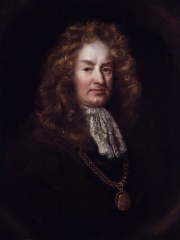
5. Elias Ashmole (1617 - 1692)
With an HPI of 65.47, Elias Ashmole is the 5th most famous British Occultist. His biography has been translated into 27 different languages.
Elias Ashmole (23 May 1617 – 18 May 1692) was an English antiquary, politician, officer of arms, astrologer, freemason and student of alchemy. Ashmole supported the royalist side during the English Civil War, serving in the artillery of Lord Astley's Regiment of Foot. He held the military rank of a captain. At the restoration of Charles II, Ashmole was rewarded with several lucrative offices. In his later years, he collected notes on his life in diary form to serve as source material for a biography. His diary was posthumously published in 1717. Ashmole was an antiquary with a strong Baconian leaning towards the study of nature. His library reflected his intellectual outlook, including works on English history, law, numismatics, chorography, alchemy, astrology, astronomy and botany. Although he was one of the founding Fellows of the Royal Society, a key institution in the development of experimental science, his interests were antiquarian and mystical as well as scientific. He was an early freemason, although the extent of his involvement and commitment is unclear. Throughout his life he was an avid collector of curiosities and other artefacts. Many of these he acquired from the traveller, botanist and collector John Tradescant the Younger. Ashmole donated most of his collection, his antiquarian library and priceless manuscripts to the University of Oxford to create the Ashmolean Museum, Britain's first public museum.

6. Alice Bailey (1880 - 1949)
With an HPI of 64.88, Alice Bailey is the 6th most famous British Occultist. Her biography has been translated into 25 different languages.
Alice Ann Bailey (16 June 1880 – 15 December 1949) was a British and American writer. She wrote about 25 books on Theosophy and was one of the first writers to use the term New Age. She was born Alice La Trobe-Bateman, in Manchester, England and moved to the United States in 1907, where she spent most of her life as a writer and teacher. Bailey's works, written between 1919 and 1949, describe a wide-ranging neo-theosophical system of esoteric thought covering such topics as how spirituality relates to the Solar System, meditation, healing, spiritual psychology, the destiny of nations, and prescriptions for society in general. She described the majority of her work as having been telepathically dictated to her by a Master of Wisdom, initially referred to only as "the Tibetan" or by the initials "D.K.", later identified as Djwal Khul. Her writings bore some similarity to those of Madame Blavatsky and are among the teachings often referred to as "Ageless Wisdom". Though Bailey's writings differ in some respects from the Theosophy of Blavatsky, they have much in common with it. She wrote on religious themes, including Christianity, though her writings are fundamentally different from many aspects of Christianity or other orthodox religions. Her vision of a unified society included a global "spirit of religion" different from traditional religious forms and including the concept of the Age of Aquarius.

7. Charles Webster Leadbeater (1854 - 1934)
With an HPI of 63.45, Charles Webster Leadbeater is the 7th most famous British Occultist. His biography has been translated into 21 different languages.
Charles Webster Leadbeater (; 16 February 1854 – 1 March 1934) was a member of the Theosophical Society, Co-Freemasonry, an author on occult subjects, and the co-initiator, with J. I. Wedgwood, of the Liberal Catholic Church. Originally a priest of the Church of England, his interest in spiritualism caused him to end his affiliation with Anglicanism in favour of the Theosophical Society, where he became an associate of Annie Besant. He became a high-ranking officer of the Society and remained one of its leading members until his death in 1934, writing over 60 books and pamphlets and maintaining regular speaking engagements.

8. Michael Scot (1175 - 1232)
With an HPI of 62.42, Michael Scot is the 8th most famous British Occultist. His biography has been translated into 23 different languages.
Michael Scot (Latin: Michael Scotus; 1175 – c. 1232) was a Scottish mathematician and scholar in the Middle Ages. He was educated at Durham, Oxford and Paris, and worked in Bologna and Toledo, where he learned Arabic. His patron was Frederick II of the Holy Roman Empire and Scot served as science adviser and court astrologer to him. Scot translated Averroes and was the greatest public intellectual of his day.

9. Algernon Blackwood (1869 - 1951)
With an HPI of 62.23, Algernon Blackwood is the 9th most famous British Occultist. His biography has been translated into 29 different languages.
Algernon Henry Blackwood (14 March 1869 – 10 December 1951) was an English broadcasting narrator, journalist, novelist and short story writer, and among the most prolific ghost story writers in the history of the genre. The literary critic S. T. Joshi stated, "His work is more consistently meritorious than any weird writer's except Dunsany's" and that his short story collection Incredible Adventures (1914) "may be the premier weird collection of this or any other century".
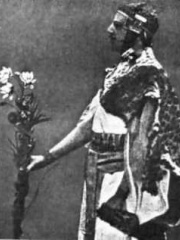
10. Samuel Liddell MacGregor Mathers (1854 - 1918)
With an HPI of 62.11, Samuel Liddell MacGregor Mathers is the 10th most famous British Occultist. His biography has been translated into 20 different languages.
Samuel Liddell (or Liddel) MacGregor Mathers (8 January 1854 – 5 or 20 November 1918), born Samuel Liddell Mathers, was a British occultist and member of the S.R.I.A. He is primarily known as one of the three founders of the Hermetic Order of the Golden Dawn, a ceremonial magic order of which offshoots still exist. He became so synonymous with the order that Golden Dawn scholar Israel Regardie observed in retrospect that "the Golden Dawn was MacGregor Mathers."
People
Pantheon has 12 people classified as British occultists born between 1175 and 1907. Of these 12, none of them are still alive today. The most famous deceased British occultists include Aleister Crowley, John Dee, and Edward Kelley.
Deceased British Occultists
Go to all RankingsAleister Crowley
1875 - 1947
HPI: 83.14
John Dee
1527 - 1608
HPI: 80.86
Edward Kelley
1555 - 1597
HPI: 67.16
Robert Fludd
1574 - 1637
HPI: 65.50
Elias Ashmole
1617 - 1692
HPI: 65.47
Alice Bailey
1880 - 1949
HPI: 64.88
Charles Webster Leadbeater
1854 - 1934
HPI: 63.45
Michael Scot
1175 - 1232
HPI: 62.42
Algernon Blackwood
1869 - 1951
HPI: 62.23
Samuel Liddell MacGregor Mathers
1854 - 1918
HPI: 62.11
Dion Fortune
1890 - 1946
HPI: 60.25
Israel Regardie
1907 - 1985
HPI: 57.25
Overlapping Lives
Which Occultists were alive at the same time? This visualization shows the lifespans of the 7 most globally memorable Occultists since 1700.

